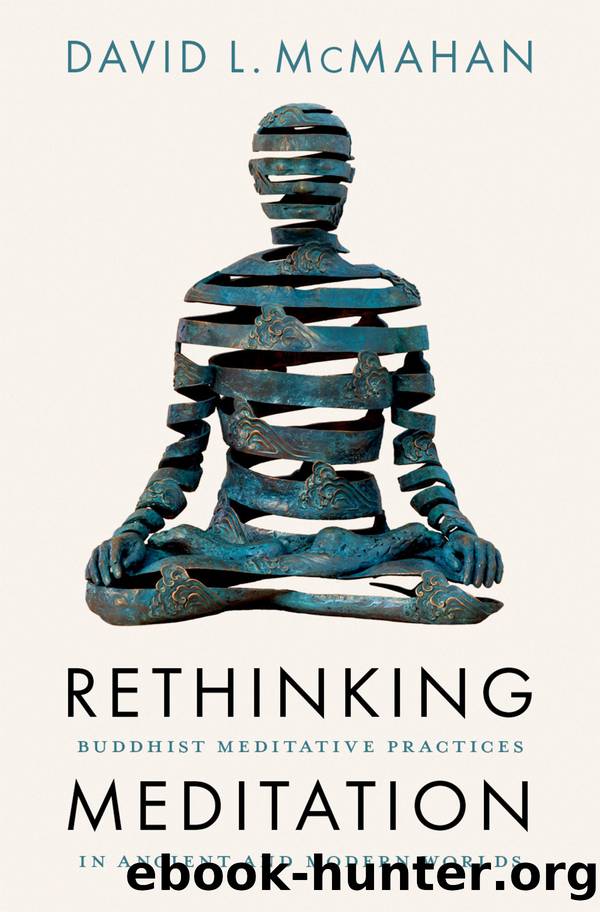Rethinking Meditation by David L. McMahan

Author:David L. McMahan
Language: eng
Format: epub
Publisher: Oxford University Press
Published: 2023-09-15T00:00:00+00:00
Secularism and the Secular Meditator
The imperative in much contemporary meditation for avoiding the supernatural and focusing on interiority and this-worldly concerns is itself conditioned by what we might think of as the dominant discourse of the late modern liberal societies: secularism. We cannot address the Standard Version of meditation without understanding that it has been configured specifically within the parameters of the secular. For the past 150 years or so, Buddhists and Buddhist enthusiasts have often presented the Dharma to the world more as a philosophy or âway of lifeâ than a religion. Revitalization movements of the colonial period de-emphasized the ritual, devotional, and supernatural elements of Buddhism ubiquitous in Asia and highlighted its philosophical, ethical, and psychological features, tailoring these in dialogue with various strands of secular (and its new cousin, âspiritual,â McMahan 2012) thought in the Westâpsychology, transcendentalism, rationalism, romanticism, and liberalism. This endeavor was spearheaded mostly by Asian Buddhists keen to rethink Buddhism in light of emerging global currents of thought; it was also a strategic effort to rebuff the denigrating images of Buddhism and the subjugation of Buddhist populations under colonialism. These reformers translated Buddhism into the philosophical and religious terms of the European colonial powers in order, in turn, to critique those powers and stake an intellectual, ethical, and cultural claim for Buddhism in the world of globalizing modernity. Thus, Buddhism in the nineteenth century began to be framed as a psychology, a system of rational ethics, and a source of spiritual wisdom for an increasingly mechanized, industrialized, and dispirited world. And, indeed, Buddhism has gained a great deal of prestige by being cast as a kind of secular spirituality that mitigates the dehumanizing forces of industrial and postindustrial modernity but does not transgress the dominant discourse of the scientific worldview and the liberal political order.
When people today think of the increasing effects of secularism on Buddhist meditation, they might ask questions like: should meditation be secularized? Is secularized meditation authentic? Does it strip away too many essential elements of Buddhism? Rather than weigh in on the merits and defects of a secularized meditation, I want to think through some issues involving how two long, variegated traditionsâBuddhist meditation and modern secularismâconverge. Often when people speak to the issue of secularized meditation, they speak in terms of explicit beliefs. Might meditation mitigate the possibility of rebirth as a hungry ghost or in a hell realm? Does it foster supernormal powers like telepathy or teleportation? Might it be helpful in warding off evil spirits? The fewer things like these that meditators believe, the more secular their practice, some would say. These kinds of questions play an important role in secularizing meditation, especially because one common use of the term secularism today involves explicit beliefs. In fact, there is a Secular Buddhism movement today that explicitly rejects elements of Buddhism like rebirth, traditional cosmology, supernatural beings, and others that do not conform to modern scientific understanding of the world and the human being.3 But we might also consider
Download
This site does not store any files on its server. We only index and link to content provided by other sites. Please contact the content providers to delete copyright contents if any and email us, we'll remove relevant links or contents immediately.
The Way of Zen by Alan W. Watts(5813)
Ego Is the Enemy by Ryan Holiday(4003)
The Art of Happiness by The Dalai Lama(3391)
The Book of Joy by Dalai Lama(3237)
Why Buddhism is True by Robert Wright(2833)
Shift into Freedom by Loch Kelly(2698)
Spark Joy by Marie Kondo(2686)
Happiness by Matthieu Ricard(2530)
A Monk's Guide to a Clean House and Mind by Shoukei Matsumoto(2410)
The Lost Art of Good Conversation by Sakyong Mipham(2129)
The Meaning of the Library by unknow(2073)
The Third Eye by T. Lobsang Rampa(1887)
The Unfettered Mind: Writings from a Zen Master to a Master Swordsman by Takuan Soho(1864)
Anthology by T J(1758)
Red Shambhala by Andrei Znamenski(1752)
The Diamond Cutter by Geshe Michael Roach(1675)
Thoughts Without A Thinker: Psychotherapy from a Buddhist Perspective by Epstein Mark(1596)
Advice Not Given by Mark Epstein(1524)
Twilight of Idols and Anti-Christ by Friedrich Nietzsche(1498)
